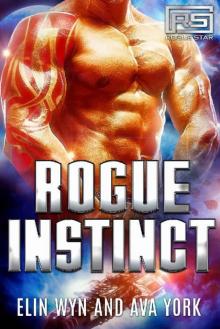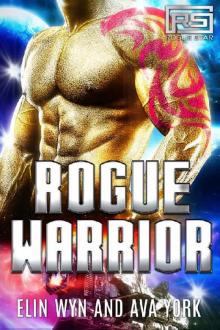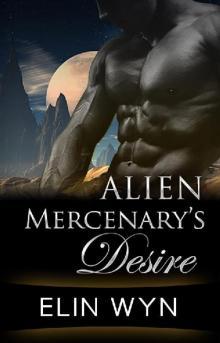Rouhr Read online
Rouhr
Conquered World: Book Six
Elin Wyn
Contents
1. Rouhr
2. Vidia
3. Rouhr
4. Vidia
5. Rouhr
6. Vidia
7. Rouhr
8. Vidia
9. Rouhr
10. Vidia
11. Rouhr
12. Vidia
13. Rouhr
14. Vidia
15. Rouhr
16. Vidia
17. Rouhr
18. Vidia
19. Rouhr
20. Vidia
21. Rouhr
22. Vidia
23. Rouhr
24. Vidia
25. Rouhr
26. Vidia
27. Rouhr
28. Vidia
29. Epilogue: Vidia
Letter from Elin
Please don't forget to leave a review!
Don’t Miss the Star Breed!
About the Author
Also by Elin Wyn
1
Rouhr
The first thing that hit me in the morning was a fresh stack of datapads.
I suspected that those who delivered reports strategically picked times they knew I wouldn’t be in.
Perhaps I’d bring a cot into my office and sleep there from now on. It would save me the time of walking back and forth to my cabin and force the shy datapad deliverers to face me.
I shook the thought away and picked up the first datapad in the new stack. No surprise, it was from Thribb, as was the one underneath it. A quick glance told me they contained much of the same information as the one he’d dropped off in the late hours of last night.
I valued Thribb’s council, as well as the information he brought to my attention, but this was becoming excessive.
Time for something else.
The next contained a report from one of the evening guards who witnessed a small skirmish between two of the human refugees.
One stole the blanket of another, despite the fact she already had one of her own. An argument ensued, but the guard dispersed it, and the blanket was returned to its rightful owner.
That was something I’d noticed about humans. In times of crisis, they either banded together in a terrific show of support or turned on each other completely.
I was glad that the majority of the humans I’d met fell into the former category rather than the latter, though naturally there were a few exceptions.
As the unofficial leader of the refugees, I was sure Vidia Birch received a copy of this. She’d held a position of power in one of the first towns attacked by the Xathi, and the humans respected her.
Early on, we agreed that she’d handle the majority of the disciplinary actions in regard to the humans. It took a significant weight off my shoulders. It was only for serious offenses that I became involved, as it had been with Ren, the human Xathi informant.
I picked up the next in the stack.
Skrell.
Urai surveillance had shown that the Xathi mother ship was undergoing repairs. The damage that had been inflicted on it from its crash landing on the planet, as well as the battle that we had waged when killing the sub-queen, was in the process of being repaired.
Based on satellite photos, Fen and her team calculated that the Xathi ship would be spaceworthy in ten days.
When that happened, the slight advantage we had at this point over the Xathi would vanish.
The next report from the human doctor, Evie Parr, was far more hopeful. She was working on developing a cure to reverse the effects of hybridism.
The Xathi had infected the minds of a shockingly high number of humans, more than we’d ever seen before. The more control the Xathi held of the infected, the more Xathi-like they became.
Up until recently, we’d believed this was an irreversible condition.
Evie had been working practically around the clock since I’d sent her on a mission to the human city of Einhiv to study the condition.
The mission itself wasn’t much of a success. Evie almost succumbed to hybridism in the process, but managed to escape it.
But not long ago, Evie had found a selection of naturally occurring chemicals in the brain that, when combined with certain chemical agents, affected the spread of hybridism. The datapad she left for me didn’t contain news of a major breakthrough, as I’d hoped, just the details of a few small steps in the right direction.
I tried to keep my hopes realistic.
The Urai lab was more advanced than ours on the Vengeance, but even its resources were limited. I hoped Evie could find what she needed to solve this puzzle.
And now, there was no more avoiding it.
Time for Thribb.
Head Engineer Thribb was tasked with keeping me abreast of the Aurora’s repair progress.
At present, the top priority was repairing the significant damage done to the Aurora’s hull. It was almost completely split open on one side when the ship crash landed on the planet’s surface after falling through a rift in space, a rift my men, and myself by extension, were responsible for creating.
Fen had also provided me with updates about the quickly improving structural integrity of the ship. Progress had nearly tripled since an ancient space-travel device known as the Gateway was found and recovered by a small team of humans, my men, and a Urai scientist.
The Gateway was able to stabilize the rift, and the Urai were able to funnel more power to the Aurora. Now, the whole of the Urai’s advanced technology was available to be used for repairs.
Thribb, however, had an ever-increasing list of other concerns, which he vocalized often. While he was pleased with the Aurora’s progress, he now spent an inordinate amount of time calculating what would be required to make the ship efficient and safe for long-term space travel.
He, and a number of others, desired to leave the planet as soon as possible.
I understood their reasoning for that. According to his reports, available resources onboard were stretched thin between the humans and the crew. If we took on any more refugees, there would be even less to go around.
Still, there were camps of humans fleeing from the Xathi. Thribb knew I had every intention of opening up the Aurora to them if we found them, or if they found us.
Which brought up another of Thribb’s many concerns: weight. When, or if, the Aurora was ready to fly again, the less weight she carried, the easier her journey would be.
Once, he had been bold enough to suggest that we dismiss any human that wasn’t working toward the Aurora’s repairs, but he received an instant reprimand from me.
The humans on this ship would be allowed to stay on this ship if they so chose, regardless of whether or not the Aurora ever flew again, regardless of their ‘usefulness’ to the mission.
And none of this addressed my growing concern: it didn’t matter how many times I explained to Thribb that we didn’t know if the Aurora would ever be fit for space travel again, he had convinced himself that she would be.
Ordinarily, I wouldn’t tolerate it, but it seemed to be the only thing keeping Thribb going. Hope was harmless enough, and I wouldn’t take that away from him.
Eventually, if his hopes were fulfilled, I’d have to make the choice of leaving this planet or staying on to help the humans.
The numbers all indicated that leaving was the most logical thing to do, but if it came down to it, could I bring myself to abandon the humans to the Xathi?
“General.” A soldier appeared in the doorway to my office, a tinge of worry in his voice despite the ramrod posture.
“Is something the matter?” I set the datapad down.
“Xathi are approaching the Aurora from the south, sir.”
“How many?”
“Les
s than ten, but they have a mass of hybrids with them. I couldn’t get a clear count.”
“Is the barrier holding?” Thus far, the sonic barrier surrounding the Aurora had yet to be extensively tested.
Recently perfected and tested in a few small-scale skirmishes with the Xathi and hybrids, the barrier projected the same frequency as our neurogrenades, only it was much stronger.
With the help of the Urai, we were able to perfect the technology that ensured a barrier of safety around the Aurora. The grenades were strong enough to disrupt a Xathi individual’s connection to the hive-mind and the queen, causing some to roam aimlessly, others to spasm and collapse.
This was a variation of the barrier the Aurora had once used in space. Now it was a combination of the technology the Vengeance crew had devised, that the humans had added their expertise to, and the Urai had provided the missing link for—a true model of interspecies coordination and cooperation.
It had the ability to give us yet another advantage in our conflict with the Xathi.
In its first real test, I was curious to see how the barrier held up.
“Last I saw, the Xathi were still examining the barrier from a distance. It’s possible they can sense the barrier,” he reported.
“Mobilize ground teams A and C in front of where the Xathi were gathering.” I ran over the rest of my schedule mentally.
Skrell it.
“I’ll join you shortly.”
The soldier nodded and walked away briskly.
In one of my larger desk drawers, I kept a blaster and a tactical vest. I tugged the vest on and strapped the blaster to my hip. If necessary, I could borrow a more powerful weapon from the one of the ground teams.
I hurried outside, expecting to be rushing into a firefight, but when I arrived, very little was happening.
“Report.” I nodded to the leader of ground team A. He was a Valorni, as were the majority of the soldiers that made up the ground teams. Their superior strength made them ideal for hand-to-hand combat.
The leader pointed out that the Xathi were as close as they could get to the widest part of the tear in the hull.
“Only a few hybrids have attempted to cross the barrier, General. But none have been successful. It’s killed some, but that doesn’t appear to deter the others. The Xathi won’t get close to it. I think they know what it will do to them.”
“Odd. If they know they can’t get through, then why bother?”
“Who can say?” the soldier shrugged.
“Perhaps it’s about the Gateway,” I mused. “Enough hybrids saw Daxion and Amira with it, the queen must be able to assume it’s here. That might make a renewed attack worth the resources to her.”
“Makes sense to me.” He resumed his tense watch, waiting for a break in the pattern.
Another hybrid approached the barrier, this one so overgrown with crystals that it was hard to tell it was once human. My mind wandered to Evie and her cure.
Seeing that wretched creature before me diminished my hope that anything could be done for it.
Though the barrier itself was all but invisible, aside from the tall metal spikes that transmitted the sonic frequency, I could tell exactly when the hybrid came into contact with it. Its body went rigid, and it looked like it was trying to remove its head from its body. Eventually, it skittered backward, much to the displeasure of the observing Xathi.
“What should we do, General?”
After what I’d seen, I wasn’t concerned about the Xathi getting through the sonic barrier, but they would make trouble when we eventually needed to go beyond the safety of the Aurora.
If a small team needed to deploy on a scouting mission, the Xathi would know exactly how many were in the team and where they were going.
If more joined the mob that had already gathered around the Aurora, we risked becoming trapped.
“Mobilize the strike teams. Tell them to load minimal ammo and see if they can clear this mess away.” I gestured to the small mob of hybrids and Xathi. “Ground team A can return to their usual duties.” The soldier nodded once and departed.
Thribb had been particularly up in arms about ammo conservation. I agreed that we did need to use it sparingly until we could craft suitable replacements, but driving off a mob certainly qualified as a just reason.
A figure appeared in the corner of my eye. I tried not to wince as he approached.
“General, a word?” Thribb appeared at my side.
I forced a smile and nodded for him to speak.
“I’ve been running calculations—”
“As always.” Thribb laughed uncomfortably as I cut in.
“Yes, General. As always. I’m sure you know what I’m going to say.”
“That it’s imperative we vacate the planet as soon as possible?”
“Exactly.” Thribb nodded. “The thing is, General, I don’t believe you understand how dire our situation is becoming. I mean no disrespect.”
“Yet, you’ve managed it.” I tried to keep my irritability in check. Thribb’s people weren’t big on social nuances. But this obsession of his was getting out of hand.
“Apologies. I’ve been allowed access to the Urai’s interstellar maps. They’re remarkably extensive. This is the first time I’ve gotten a clear picture of exactly where we are in the known universe. We are impossibly far from our home galaxy. The nearest planet suitable for landing will take a considerable amount of time for us to reach. We must start soon.”
“How are you planning for us to make it home?” There was something terribly wrong with his reasoning, but he couldn’t see it. “Or are you planning to use the Gateway?”
“We must leave immediately if we are to have any hope at all,” he insisted. “The Gateway is still untested.” He scowled. “Even if it does work, it only eliminates the concern for traveling distances. The Gateway cannot generate food, assist in emergency repairs, or maintain suitable oxygen levels and cabin pressure. We have what we need to maintain those things now, but the longer we linger on this planet, the less we will have when it comes time to leave.”
“Yes, I believe you’ve told me that before.” I tried not to grit my teeth.
“Then why haven’t you—”
“Then why haven’t I what? Abandoned the planet? Abandoned a civilian population to whom we’ve brought a war? You insist that I don’t understand, but I suspect it is you, Thribb, who doesn’t understand. I know little of your people, but I cannot imagine them all to be as unfeeling as you have shown me you can be.”
“It’s my job to assure that our vessel, whichever vessel that may be, is fit for space travel and assure the safety of those on board. Your unwillingness to face reality,” he waved his datapad which contained his multitude of calculations, “has made my job very difficult as of late.”
“You’re out of line.” I never raised my voice when I was angry, but Thribb knew my temper was reaching its snapping point.
At least he had the decency to step back, even if he kept chattering. “It would go against my conscience to stay silent when you are putting the crew at serious risk. I believe you’ve become too emotionally invested, and that has marred your ability to make rational decisions, despite the overwhelming evidence that immediate evacuation is the only choice.”
“You’re dismissed, Thribb. Don’t come to me again unless you’ve obtained new information.”
“But, General—”
“Dismissed!”
Thribb left without another word.
I stood behind my men and watched the hybrids continuously try to move through the sonic barrier.
As much as I tried to put it out of my mind for the time being, there was something Thribb had said that stuck with me.
Many that I’d served under in the past preferred to leave their emotions out of the equation.
They claimed it made making difficult choices much easier.
Up until now, I’d strongly disagreed.
I believed becoming emotional
ly invested allowed the right decision to shine through more clearly.
However, this wasn’t just a difficult decision—this was an impossible decision. I had to consider the fact that Thribb might have a point.
Perhaps this was a decision that needed to be made only with logic.
2
Vidia
Between wrangling minor disputes between refugees, assigning quarters, and attempting to help locate missing family members from the Xathi attacks, lately I’d spent every moment of any spare time in the labs with Evie.
General Rouhr had said he’d give us as much time as possible to find a cure for the hybrids, but we all knew the clock was ticking.
Medical science and chemistry weren’t my strong suits, so I’d enlisted Leena to assist Evie. With both of their capable hands, it was easier to run tests and analyze data, and I could wash bottles, carry, and fetch.
Anything to help.
Already, Leena had a few ideas. I didn’t understand much of the technical talk, but essentially, Leena had a list of adjustments she could make to the synthetic chemicals she’d created to make them more efficient and effective than the naturally occurring brain chemicals Evie was experimenting with.
Evie and Leena made a fantastic team. They’d shared a lab on the Vengeance and were already accustomed to working with each other.
On Fen’s recommendation, I’d brought in a Urai scientist named Glint, who had conducted several in-depth studies on the Xathi before landing on our planet.
Glint wasn’t one for conversation, but from the excited chatter of Evie and Leena, she knew what she was doing and had filled in a missing piece of the puzzle.

 Sylor
Sylor Iq'her
Iq'her Cazak
Cazak Sa'lok
Sa'lok Rogue Instinct
Rogue Instinct The Alien Reindeer's Redemption
The Alien Reindeer's Redemption Tyehn
Tyehn Rokul
Rokul Rouhr
Rouhr Rogue Sign
Rogue Sign Jalok
Jalok Karzin
Karzin Zarik
Zarik Sk'lar
Sk'lar Rogue Warrior
Rogue Warrior The Gate Jumpers Saga: Science Fiction Romance Collection
The Gate Jumpers Saga: Science Fiction Romance Collection Vrehx's Quest
Vrehx's Quest Navat
Navat Given to the Wolf (The Wolves of the Daedalus Book 1)
Given to the Wolf (The Wolves of the Daedalus Book 1) Freed by the Wolf
Freed by the Wolf Takar
Takar Given
Given Caged with the Wolf (The Wolves of the Daedalus Book 3)
Caged with the Wolf (The Wolves of the Daedalus Book 3) Snared_A Science Fiction Adventure Romance
Snared_A Science Fiction Adventure Romance Alien Mercenary's Desire
Alien Mercenary's Desire Island Stars
Island Stars Axtin: A Science Fiction Adventure Romance (Conquered World Book 2)
Axtin: A Science Fiction Adventure Romance (Conquered World Book 2) Craved_A Science Fiction Adventure Romance
Craved_A Science Fiction Adventure Romance Freed
Freed Snared
Snared Craved
Craved